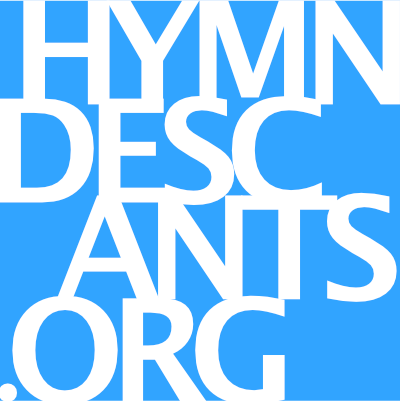Audio Demo - [ intro ad lib ] - [ hymnal verse ] - [ SATB verse adapt fr. RVW ] - [ organ ad lib ] - [ descant ] Free score.
1
Lo! he comes with clouds descending,
once for our salvation slain;
thousand, thousand saints attending
swell the triumph of his train:
Alleluia! Alleluia! Alleluia!
Christ the Lord returns to reign.
2. satb adapt fr. RVW
Those dear tokens of his passion
still his dazzling body bears,
cause of endless exultation
to his ransomed worshipers;
with what rapture, with what rapture, with what rapture,
gaze we on those glorious scars!
4 descant
Yea, amen! let all adore thee,
high on thine eternal throne;
Savior, take the power and glory;
claim the kingdom for thine own:
Alleluia! Alleluia! Alleluia!
Thou shalt reign, and thou alone.
The tune HELMSLEY, though usually attributed to mid-1700's figures Augustine Arne or Thomas Olivers, was actually in established use prior to either writer, already with one of several variants of the hymn "Lo, he comes with clouds descending." Martin Madan, the chaplain of Lock Hospital, published it with this text in Collection of Psalm and Hymn Tunes Never Published Before (1763). It circulated in nonconformist (ie, non-liturgical) use until the setting was 'discovered' and reharmonized by Ralph Vaughan Williams for the 1906 English Hymnal, which has become the canonical pairing of this tune and text, providing it with the majesty the text demands.
In its current form, the text is an ideal Advent hymn as it recalls Christ's incarnation and passion, before turning to the second coming. The text originates in a 1750 hymn/poem by John Cennick, a land surveyor who became a Moravian preacher. The text was adapted (and largely rewritten) by Charles Wesley and subsumed into the Methodist movement, the first Wesleyan version appearing in 1758. Several revisions and iterations of the text were undertaken, some by Wesley, some by others which have merged back in some of Cennick's original language. The exact phrase "Lo he comes with clouds descending" comes from a poem by Olivers, as Cennick's original began, in a different meter, "Lo! He cometh, countless trumpets blow." Because it was not an observed season in reformation churches, it would not have been seen in its time as an Advent hymn.
Updated Jan 2023 with ossia for an alternate rhythm, lower tessitura at cadence
References
- Glover, Raymond F., Hymnal 1982 Companion. United States, Church Publishing, Incorporated, 1994. Vol. 3A, pp. 106-110.
- History of Hymns, UMC Discipleship Ministries: “Lo, He comes with clouds descending”, C. Michael Hawn.
- Wikipedia: "Lo! he comes with clouds descending"
Includes score and separate part for the descant, along with intro and and SATB verse.
Version for five-part brass, congregation, choir, and organ available.
DESCANT VERSE
Yea, amen! Let all adore thee,
high on thine eternal throne;
Savior, take the power and glory;
claim the kingdom for thine own:
Alleluia! Alleluia! Alleluia!
Thou shalt reign, and thou alone.
– John Cennick, 1750 alt.

